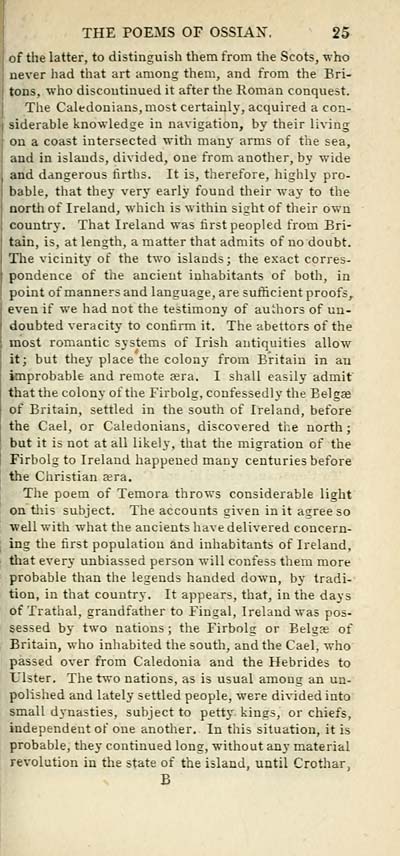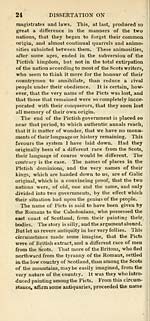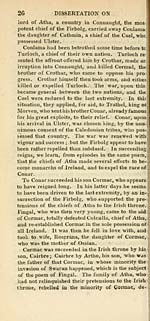Ossian Collection > Poems of Ossian
(73)
Download files
Complete book:
Individual page:
Thumbnail gallery: Grid view | List view

THE POEMS OF OSSIAX. 25
. r t-.t' latter, to distinguish them from the Scots, who
i.r\. r iiad that art among them, and from the Bri-
ton-, who discontinued it after the Roman conquest.
iac Caledonians, most certainly, acquired a con-
siderable knowledge in navigation, by their living
on a coast intersected with many arms of the sea,
and in islands, divided, one from another, by wide
and dangerous firths. It is, therefore, highly pro-
bable, that they very early found their way to the
north of Ireland, which is within sight of their own
country. That Ireland was first peopled from Bri-
tain, is, at length, a matter that admits of no doubt.
The vicinity of the two islands; the exact corres-
pondence of the ancient inhabitants of both, in
point of manners and language, are sufficient proofs,
even if we had not the testimony of authors of un-
doubted veracity to confirm it. The abettors of the
most romantic systems of Irish antiquities allow
it; but they place the colony from Britain in an
improbable and remote aera. I shall easily admit
that the colony of the Firbolg, confessedly the Belgae
of Britain, settled in the south of Ireland, before
the Gael, or Caledonians, discovered the north;
but it is not at all likely, that the migration of the
Firbolg to Ireland happened many centuries before
the Christian jera.
Tlie poem of Temora throws considerable light
on tills subject. The accounts given in it agree so
well with what the ancients have delivered concern-
ing the first population and inhabitants of Ireland,
tliat every unbiassed person will confess them more
probable than the legends handed down, by tradi-
tion, in that country. It appears, that, in the days
of Trathal, grandfather to Fingal, Ireland was pos-
sessed by two nations ; the Firbolg or Belg3s of
Britain, who inhabited the south, and the Cael, who
passed over from Caledonia and the Hebrides to
Ulster. The two nations, as is usual among an un-
polished and lately settled people, were divided into
small dynasties, subject to petty kings, or chiefs,
independent of one another. In this situation, it is
probable, they continued long, without any material
revolution in the state of the island, until Crothar,
B
. r t-.t' latter, to distinguish them from the Scots, who
i.r\. r iiad that art among them, and from the Bri-
ton-, who discontinued it after the Roman conquest.
iac Caledonians, most certainly, acquired a con-
siderable knowledge in navigation, by their living
on a coast intersected with many arms of the sea,
and in islands, divided, one from another, by wide
and dangerous firths. It is, therefore, highly pro-
bable, that they very early found their way to the
north of Ireland, which is within sight of their own
country. That Ireland was first peopled from Bri-
tain, is, at length, a matter that admits of no doubt.
The vicinity of the two islands; the exact corres-
pondence of the ancient inhabitants of both, in
point of manners and language, are sufficient proofs,
even if we had not the testimony of authors of un-
doubted veracity to confirm it. The abettors of the
most romantic systems of Irish antiquities allow
it; but they place the colony from Britain in an
improbable and remote aera. I shall easily admit
that the colony of the Firbolg, confessedly the Belgae
of Britain, settled in the south of Ireland, before
the Gael, or Caledonians, discovered the north;
but it is not at all likely, that the migration of the
Firbolg to Ireland happened many centuries before
the Christian jera.
Tlie poem of Temora throws considerable light
on tills subject. The accounts given in it agree so
well with what the ancients have delivered concern-
ing the first population and inhabitants of Ireland,
tliat every unbiassed person will confess them more
probable than the legends handed down, by tradi-
tion, in that country. It appears, that, in the days
of Trathal, grandfather to Fingal, Ireland was pos-
sessed by two nations ; the Firbolg or Belg3s of
Britain, who inhabited the south, and the Cael, who
passed over from Caledonia and the Hebrides to
Ulster. The two nations, as is usual among an un-
polished and lately settled people, were divided into
small dynasties, subject to petty kings, or chiefs,
independent of one another. In this situation, it is
probable, they continued long, without any material
revolution in the state of the island, until Crothar,
B
Set display mode to: Large image | Transcription
Images and transcriptions on this page, including medium image downloads, may be used under the Creative Commons Attribution 4.0 International Licence unless otherwise stated. ![]()
| Early Gaelic Book Collections > Ossian Collection > Poems of Ossian > (73) |
|---|
| Permanent URL | https://digital.nls.uk/77989756 |
|---|
| Description | Selected books from the Ossian Collection of 327 volumes, originally assembled by J. Norman Methven of Perth. Different editions and translations of James MacPherson's epic poem 'Ossian', some with a map of the 'Kingdom of Connor'. Also secondary material relating to Ossianic poetry and the Ossian controversy. |
|---|
| Description | Selected items from five 'Special and Named Printed Collections'. Includes books in Gaelic and other Celtic languages, works about the Gaels, their languages, literature, culture and history. |
|---|

